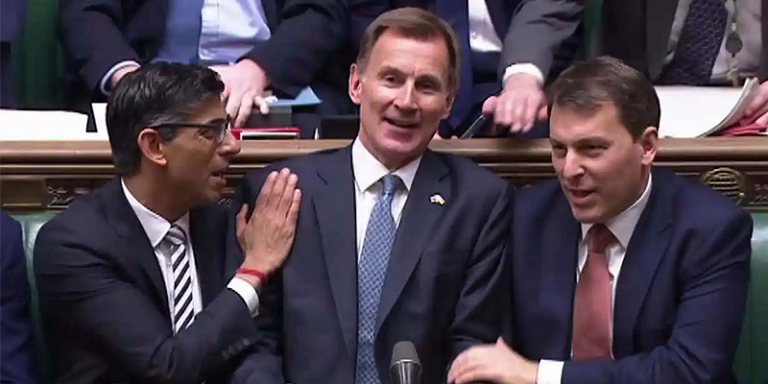Five big questions from the Autumn Statement
18 November 2022
As temperatures dropped across the UK, there was another chill in the air as the chancellor rose to give his Autumn statement.

Here at the UCL Policy Lab, we’ll be working to understand and analyse the Statement, including how the decisions and economic headwinds are affecting our everyday lives. As we start, we’ve identified the first big questions from Jeremy Hunt's statement.
1. What’s the plan for growth?
Say what you like about Liz Truss and Kwasi Kwarteng – and a lot is said – but at least we knew what they were about. “Growth” was their prime objective and they believed that Britain could get it by radically reducing taxes, especially on the better off. It is much less clear what the new leadership thinks. The OBR predicts that the UK economy will shrink by 1.4% in 2023, the weakest economic performance in Europe. Britain will be the only G7 country whose economy remains smaller than before the pandemic. Moreover, even when the OBR predicts the economy will start growing again it is only because it expects people to dip into their savings to keep their spending going and because it expects immigration to stay at historically high levels.
So where else might growth come from? Jeremy Hunt mentions skills and education—clearly crucial, but few would be able to identify a strategy or a plan, and that surely is both an opportunity for the government’s opponents and a cause for some real concern.
2. What is the role for public service reform?
Chancellors often surprise us with a so-called ‘rabbit out of the hat’ moment. Gordon Brown and George Osborne both enjoyed the fiscal trick. A way to boost popular support and send a message about the direction of government. Jeremy Hunt opted to surprise not with a tax giveaway but with two Labour grandees. He appointed Patricia Hewitt and Michael Barber to help him reform public services and build a policy for skills. In doing so, Hunt sought to signal that the government was still willing to undertake public sector reform.
Clearly public services do need reform. For anyone who has had to order a passport, renew a driving license or book a GP appointment, the need for change is clear. Yet this is a government that has been in power for over 12 years and a Conservative party that seems increasingly willing to rebel. To undertake reform, the Conservatives will need energy, discipline and a strong sense of direction. It’s not at all clear they have these. But time will tell.
3. Is compassionate conservatism really back?
Alongside sound money and fiscal prudence. Rishi Sunak and Jeremy Hunt sought to resurrect another Cameron-era political label, ‘compassionate conservativism’. With the inflation-matching rise in benefits and targeted support on energy bills, the government sought to demonstrate they’re supporting those in genuine need at a time of rising prices and stagnant wages. In hitting higher earners with tax rises, they want to show that those with the broadest shoulders bear the brunt of the costs. Yet even with these changes, the picture remains bleak for millions and especially for those on low incomes. The historic squeeze on living standards we are all about to live through will not feel like compassion to many.
4. What happens to net-zero?
War in Ukraine and the energy crisis have focused minds on energy policy. And more specifically, on how Britain could become ‘Energy self-sufficient’. As an Island nation, the UK has some clear natural advantages in renewable energy. But for this renewable, net-zero dream to be realised, there will be a need for continued long-term investment by both the government and the private sector, and once again the chancellor’s statement left as many questions as answers in this regard. Plans for massively enhancing the insulation of our homes will not come into practice for years to come and there was remarkably little said about investment in new technologies beyond the usual rhetorical commitments. Moreover, while net zero remains politically popular in general, it continues to be controversial among some prominent conservatives. There could well be continued pressure from elements of the chancellor’s own party further to water down or delay measures. How Sunak and Hunt respond will be critical to the future of both the economy and the climate.
5. Will tax rises cause rebellion in the Tory party?
Tim Shipman of The Sunday Times observed that the House of Commons was almost “funereal” on Thursday. On the government’s own benches it wasn’t just the dire growth figures or the looming spectre of cuts to public spending that were dampening moods. Rather it was the combined anxiety that taxes were rising again, to the highest level since the Second World War, and that the Conservative party’s electoral prospects are hanging by a thread. Liz Truss may have crashed and burned, but the ideological flame for a low-tax Britain still burns in the hearts of many Tory MPs who continue to believe it is also a path to victory. They will, of course, all support this Autumn Statement. And we shouldn’t expect a mass rebellion in the coming days. But we shouldn’t doubt Tory MPs' unwillingness to back further tax rises. Their patience may well snap long before the next election. At which point, Sunak and Hunt will once again be left dealing with internal Tory party management over tackling just some of the challenges set out in this frostiest of Autumn Statements.
To get the latest insights, news and events sign up for the UCL Policy Lab newsletter.
 Close
Close

